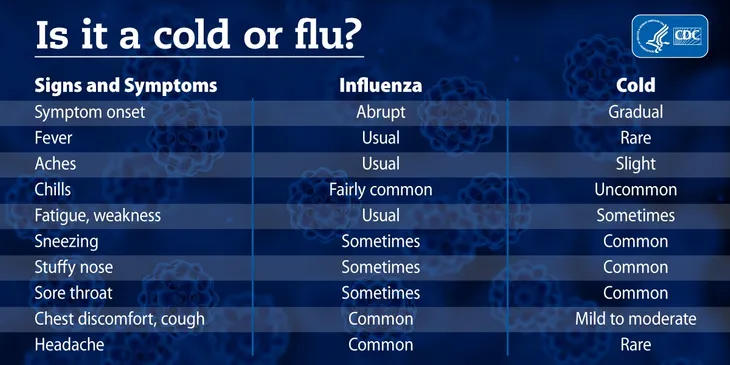Is it a cold or the flu? That’s a question many of us ask during the long, winter season. The good news is that there are a number of ways to tell the difference between the two afflictions.
The even better news is that the cold—which is shorter in duration and less intense than the flu—is far more common than influenza. Let’s take a look at some of the critical differences setting these two conditions apart as we settle into another cold season.
Early Cold and Flu Signs
The common cold typically begins with a runny or stuffy nose. this can transition into a sore throat making swallowing painful. The onset of symptoms of a cold are gradual, happening over the course of a few days or a week.
The flu proceeds in a different way. The symptoms hit you like a bus, hard and fast. You’ll have many of the same symptoms as the cold, but also have a fever, chills, fatigue, body aches, and headache says the CDC.
Temperature
How do you tell the difference between the flu and a cold? Experts suggest taking your temperature. If you have the common cold you can develop a mild fever. But with influenza, fevers tend to be higher, which can cause you to be more uncomfortable. This fever can also last several days.
That’s why it’s a good idea to have a thermometer handy during the cold season. You can acquire one at most pharmacies or department stores. (For more information, here are some Natural Fever Relievers).
Muscle Pain
It’s not unheard of for someone dealing with a common cold to feel achy and suffer headaches. But these aches—whether they affect the chest, arms, back, or head—shouldn’t be severe and rarely do they last for more than a couple days.
That’s not the case when it comes to the flu. Body aches can be severe. The flu can also be accompanied by severe headaches.
Fatigue
There’s no denying that the common cold can make us feel exhausted, preventing us from taking care of daily chores around the house, going to school, or making it into work. But it shouldn’t make doing basic tasks – like using the washroom, showering, or cooking a simple meal—nearly impossible.
But that can be the case with influenza, which is known for causing extreme fatigue. This overwhelming feeling of weakness can actually last several days or even a week. That said, if you feel like extreme fatigue associated with the flu has lasted more than seven days, it’s imperative that you consult a physician.
Complications
Both the common cold and the flu have their share of possible complications. The cold, for its part, can eventually lead to sinus infection or a middle ear infection—both of which are uncomfortable and can last several days or even a week or two.
But influenza has far more serious complications, starting with bronchitis. One of the more severe complications arising from the flu is pneumonia, which, if not treated immediately and properly, can actually be life-threatening.
Duration
The common cold shouldn’t last more than a week. In most cases it shouldn’t be accompanied by a persistent fever and won’t come with severe muscle aches that last more than a few days. Overall, if you start feeling lousy on a Monday, your cold should be alleviated by the weekend.
That’s not the case with the flu. Symptoms—from fever to aches, chills, and extreme fatigue—can last for over a week and can often lead to complications, including bronchitis and pneumonia.
 Centers for Disease Control and Prevention
Centers for Disease Control and Prevention







